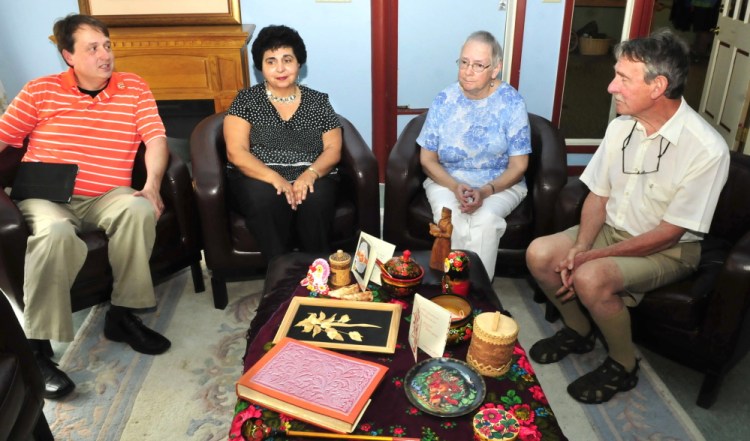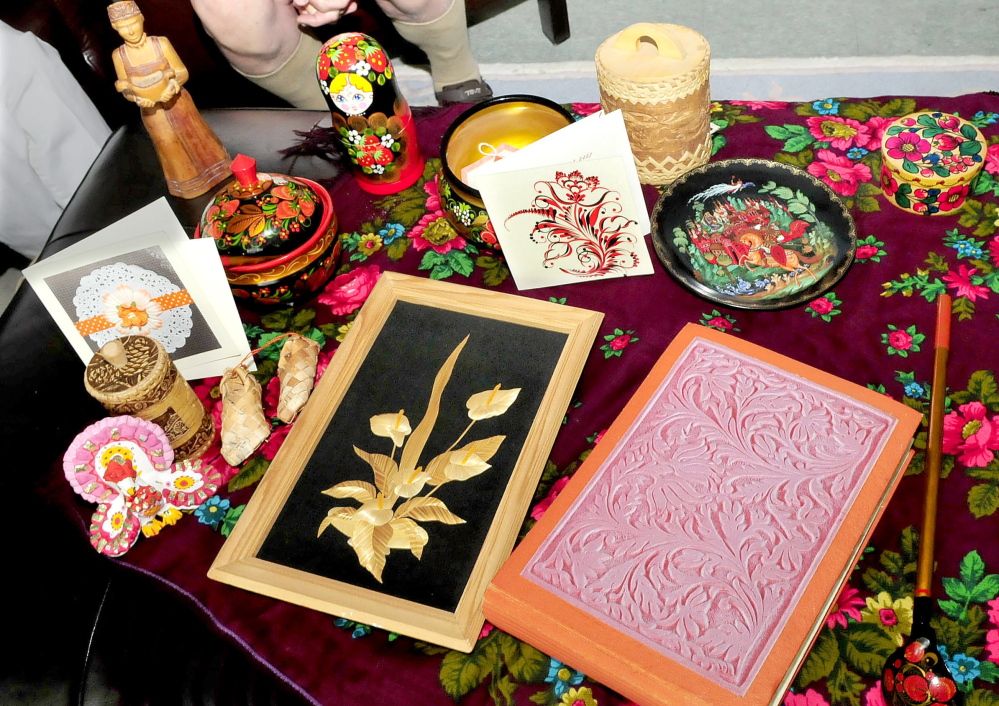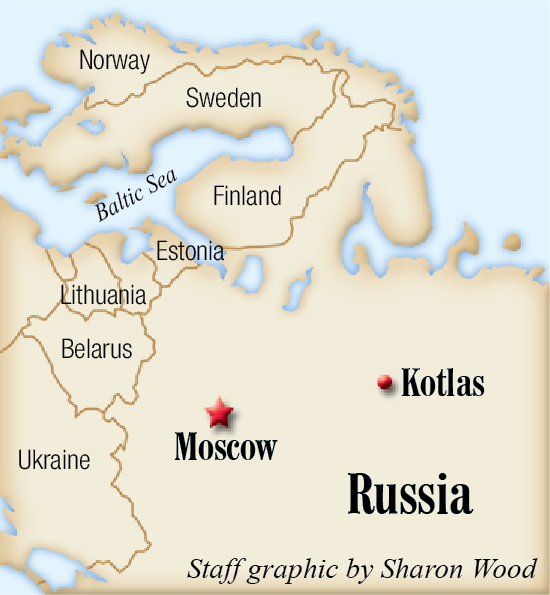WATERVILLE — Peter Garrett says the changes that have occurred in Waterville’s sister city, Kotlas, Russia, over the last 26 years since he first visited there have been tremendous.
“A lot has happened in Russia,” he said. “When we first went there, it was a Soviet country and it was communist. Then communism fell apart in 1990 or so, and there was obviously a transition period. And that was a very difficult period, because no one knew what was going to happen. It was chaotic, and I remember in 1991 people were finding it difficult to find enough food. I remember seeing potatoes growing along the banks of the railroad bed and in city green spaces.”
Garrett, 70, is a founding member of the Waterville-Kotlas Sister City Connection, a group that fosters friendship and understanding and hosts exchanges between Waterville and Kotlas. He said that during the early 1990s, one could go into a store in Kotlas and find only one or two items on a shelf.
“I went back in 1995 and things were picking up,” Garrett said. “This past April, I was bowled over by the fact that they have supermarkets and malls looking just like anything we’ve got in the U.S.”
For 25 years, Waterville-area residents have visited Kotlas and Kotlas residents have come to Waterville and elsewhere in central Maine, learning about each other and sharing education and culture. The Sister City group was established in 1990.
While Garrett, of Winslow, is no longer a member of the Sister City Connection group, he traveled to Kotlas in April with group members Mary Coombs, also of Winslow; Martha Coury Patterson, of Waterville; Mark Fisher, of Oakland; and Tessa Couture. Coombs and Patterson are co-chairwomen of the group. They all spent two weeks in Russia, including eight days in Kotlas.
On Wednesday, they met at The Center in downtown Waterville to discuss the upcoming visit of six members of Kotlas’ duma, or local government, similar to a city council.
The Russians will have tea at the Blaine House in Augusta with Gov. Paul LePage, who visited Russia as part of the Sister City Connection when he was mayor of Waterville. Kotlas Mayor Andrei V. Bralnin, 41, has visited Maine twice before and will stay at the Blaine House during his visit.
The Russians, who will be in Waterville until July 3, also are scheduled to have dinner with Mayor Nick Isgro at Joseph’s Steak House, tour Waterville and the Maine State Museum in Augusta, visit the Legislature, travel to Acadia National Park in Bar Harbor and shop at L.L. Bean, according to Patterson, who has been to Russia twice and hosted a Russian student at her Waterville home. Patterson will host an all-American barbecue at her Belgrade camp for the guests, who also will attend a lobster dinner hosted by Sister City Connection member Marilyn Hall.
Garrett said Waterville-area residents will have an opportunity to meet the Russians at a time and place to be announced.
IMMERSED IN KOTLAS CULTURE
Coombs, 68, a retired Winslow Junior High School teacher, has been to Kotlas seven times. In April, she and the others visited schools, which are different from those in the U.S., she said.
“It’s much more regimented,” she said. “The desks are shared. There are two students per desk. When we walk into the room, they stand up and they wait for the teacher to tell them to sit down. The rooms are very quiet, and students don’t talk unless given permission.”
They attend school six days a week, from 8 a.m. to 4 p.m. — and sometimes until 5 p.m. — and take part in subjects such as art and music after school, Coombs said. There are no buses. Students walk to school from their apartment buildings. They attend neighborhood schools. Typically children in grades 1 through 3 are on the first floor of the building, fifth- and sixth-graders are on the second, seventh- and eighth-graders on the third and high school students on the fourth.
Fisher, 45, a therapeutic foster parent, Oakland town councilor and book publisher, plans to host Maxim V. Dmitriev, 40, a car dealer in Kotlas who owns Opel, Nissan and Chevrolet dealerships in that city. They are the only dealerships in Kotlas, according to Fisher, who toured them.
“The salespeople don’t get paid a lot — about $50 per car sale,” Fisher said. “The cars are about 20 percent more expensive there than here.”
He said dealerships don’t sell used cars. If someone wants to sell a used car, he does so through the newspaper or online.
Fisher now is hosting a Ukrainian student, Roman Blyzniuk, at his home. Blyzniuk, who attends Kennebec Valley Community College, has been with Fisher two years. Fisher also learned Wednesday that Russian student Maksim Vaganov will arrive July 15 in Waterville and will enter an accelerated master of business administration program at Thomas College.
Patterson, 68, was particularly interested in touring hospitals in Kotlas, as she is a retired laboratory chemist who worked 50 years at MaineGeneral Medical Center. She said she couldn’t communicate through language with hospital staff members but understood everything they were showing her because it was like the equipment in U.S. hospitals.
“I understood it because I knew the instruments,” she said.
Patterson said Kotlas schools provide much better food to students than those in the U.S. do. Vegetable soups, mashed potato, chicken and vegetables are typical offerings, she said.
“There’s not a lot of obesity at all,” she said. “They don’t eat fried foods, chips and junk food.”
Coombs said children in Russia take foreign-language classes much earlier than children in the U.S. do.
“They start in second or third grade, and they’ll have the same teacher all the way through,” she said. “The result of that is teachers have a very close connection to the students. They are really mentors.”
Coombs has had three Russian students stay at her home. Her own daughter became so interested in all things Russian that she majored in Russian and physics in college and spent a semester in St. Petersburg. Patterson’s daughter and son traveled to Kotlas.
Garrett, a semi-retired hydrogeologist, said railroads in Russia are much better maintained and operated than in the U.S.
“About all the ties are concrete and the rails are smooth, too, so trains can run faster and safer than here,” he said.
HOSPITALITY ON BOTH SIDES
Patterson will host Natalia V. Verkhoutseva, 45, a supermarket director in Kotlas who has never been to the U.S.
Garrett and his wife, Jean Ann Pollard, and Coombs and her husband, Earl, will host Nikolay G. Makarovskiy, 61, and his wife, Natalia Y. Makarovskaya, 58, who will be visiting the U.S. for the first time. Russian professor Sheila McCarthy will host Andrey N. Strekalovskiy, 49, who also is visiting for the first time.
Patterson said families in Kotlas love their American friends and treat them as part of their own families.
“They take you into their homes and they feed you and they sing songs. They’re just so nice. The friendship is just so tight. We just love it.”
The Kotlas-Waterville connection is unlike any other, and the experiences shared by the people from Kotlas and Waterville are unique, according to Garrett.
“I think people who have never been involved in the sister-city arrangement don’t quite get that you can go to a travel agent down the road and book a trip to Rome or Paris — New York maybe — and you end up taking pictures of big buildings and art galleries. This is completely different. This is like a ‘home’ visit, like meeting your long-lost cousins, and they welcome you in and you end up taking pictures of them and they take pictures of you. It’s a completely different experience than what we usually think of as tourism, travel.”
The Sister City Connection is a nonprofit organization with 11 board members and about 60 members who pay dues and receive newsletters. It works with Colby College to host a “Russian sampler” event every March at which junior high and high school students learn about Russian culture, language and traditions.
Amy Calder — 861-9247
Twitter: @AmyCalder17
Send questions/comments to the editors.





